Mechi
Of Italian descent, John Joseph Mechi was born in London in 1802. From savings amassed over a ten year period from his job as a clerk, in 1827 Mechi started his own business as a cutler from 130 Leadenhall Street in the City of London.
In 1830, he moved to a larger premises at 4 Leadenhall Street. Whilst Mechi manufactured a vast array of necessities and luxury items, his Magic Strop (an instrument to maintain and sharpen cutthroat razors) is what made him extremely successful and wealthy. Mechi was a master self-promoter, and his – often over-elaborately written – advertisements were prevalent in the English periodicals.
Despite being a very talented cutler his passion was for farming; in 1841 Mechi bought a large failing farmland estate in Essex which he rebuilt and, by applying his own advanced methods and techniques as well as a great deal of money, turned it into a model farm that he renamed Tiptree Hall. This became a very profitable enterprise and Mechi was soon renowned as an agricultural expert, publishing a significant amount of literature and demonstrating his practices and machinery for the many hundreds of visitors to his farm each year.
Through his membership of the Society of Arts, Mechi became a juror for the art and science department at the Great Exhibition of 1851 and the Paris Exposition Universelle of 1855. Although his duties precluded him from competing for awards at the Great Exhibition, Mechi displayed an assortment of his wares to great fanfare, including dressing and writing cases, work boxes and even a working model of his Tiptree farm.
Ironically Mechi’s fortunes were made and lost because of the beard. Up until the Crimean War (1854-56), the fashion for gentlemen was a clean-shaven appearance. Despite beards being banned in the army, the freezing temperatures experienced by the soldiers on the Crimean peninsula along with the inability to get shaving provisions negated this rule. Soldiers returning from war sporting their beards inspired a brand new and largely adopted fashion that was now synonymous with heroism. Mechi’s razors and ‘Magic Strops’ were no longer of interest and business plummeted with an almost immediate effect. The timing was particularly dire as Mechi had recently expanded his business in 1855 with further locations at 112 Regent Street, and at the Crystal Palace, Sydenham. [The ‘Crystal Palace’ was the venue for the 1851 Great Exhibition, and was dismantled and rebuilt in Sydenham in 1854].
In 1856, Mechi became the governor of the Unity Joint Stock Mutual Banking Association as well as being appointed a Sheriff of the City of London. Moving up a rung on the political ladder, Mechi was elected as Alderman of Lime Street Ward, City of London in 1858.
Charles Bazin had worked with Mechi since 1838 and was a skilled cutler in his own right; for all intents and purposes he had single-handedly run the retail business whilst Mechi was turning his attention to his political career. In respect for Bazin’s twenty-one years of loyal support, Mechi made him a partner in the business in 1859; accordingly the business name changed to Mechi & Bazin.
Mechi & Bazin displayed a selection of their dressing cases, despatch boxes and writing table sets at the International Exhibition of 1862. Due to Bazin being one of the jurors for the ‘Toilet, Travelling, and Miscellaneous Articles’ class, Mechi & Bazin were precluded from the award assessments.
When Charles Bazin died in 1865, at the age of 40, the ownership of the business transferred back to Mechi. The 4 Leadenhall Street location was closed and the entirety of the business was moved to his Regent Street address. However it wasn’t until 1869 that the name of Mechi & Bazin officially reverted to Mechi’s own.
Mechi was an extremely well-known, determined and relentless character; his past business failures had never meant the end, they merely signified a time for necessary reinvention. However his life and fortunes permanently changed with the collapse of the Unity Joint Stock Mutual Banking Association in 1866 for which he was found chiefly responsible. As a result, he lost £30,000 [approximately £3.4 million in today’s money] from his own coffers and felt compelled to resign from his Aldermanic post and from his running for Lord Mayor of London.
On the 14th December 1880, Mechi’s retail and farming businesses were put into liquidation, with Mechi, a now broken man, dying just 12 days later on Boxing Day.
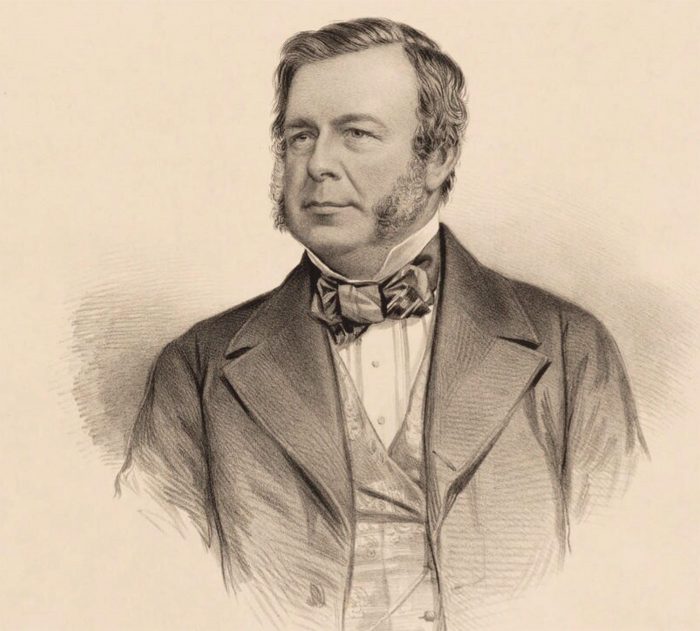
John Joseph Mechi (1802-1880).
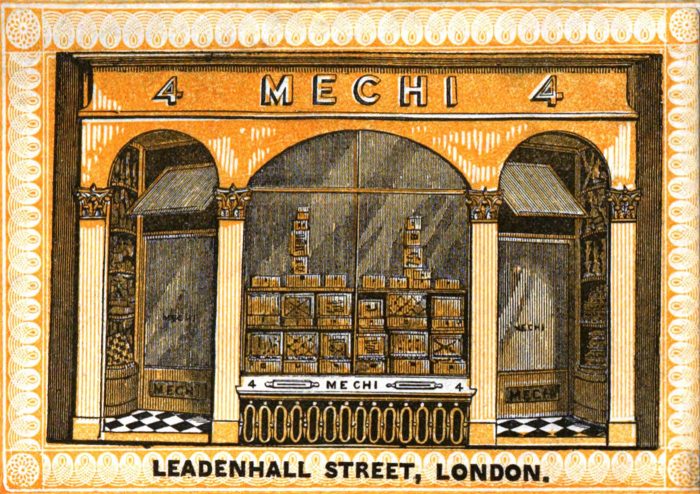
Illustration of Mechi’s shop at 4 Leadenhall Street, London taken from his catalogue entitled, ‘List of Articles Manufactured and Sold – Wholesale, Retail, and for Exportation, by Mechi, No.4 Leadenhall Street, London.’
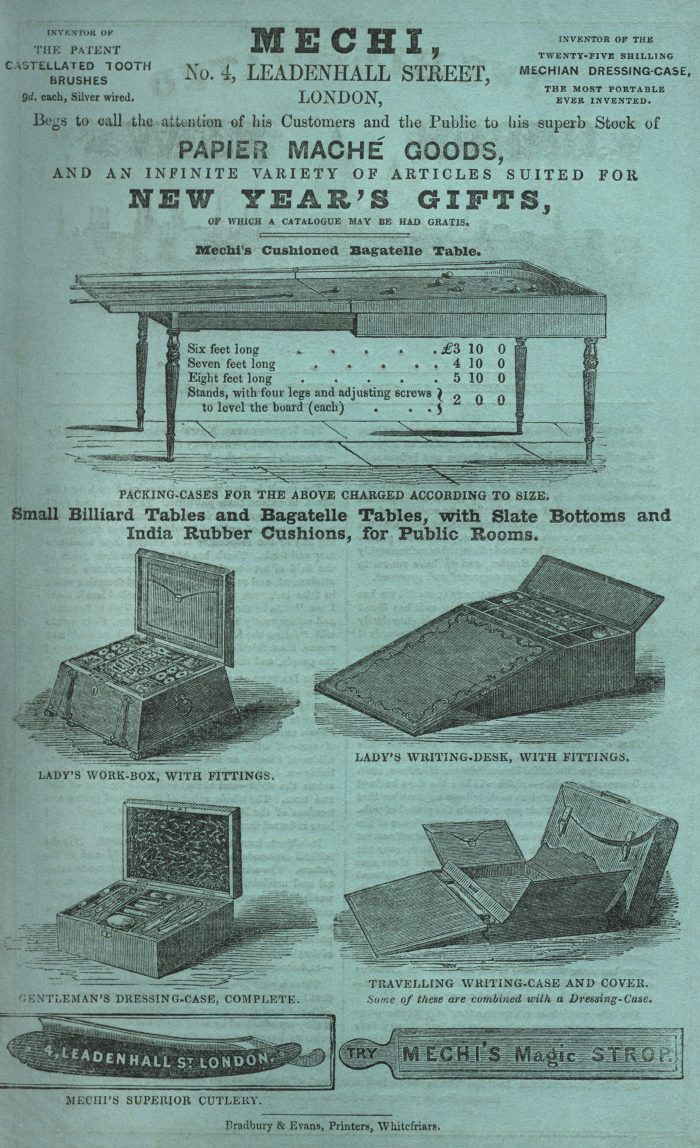
A Mechi advertisement taken from Charles Dickens’ serialised version of ‘Martin Chuzzlewit’ from January 1844.
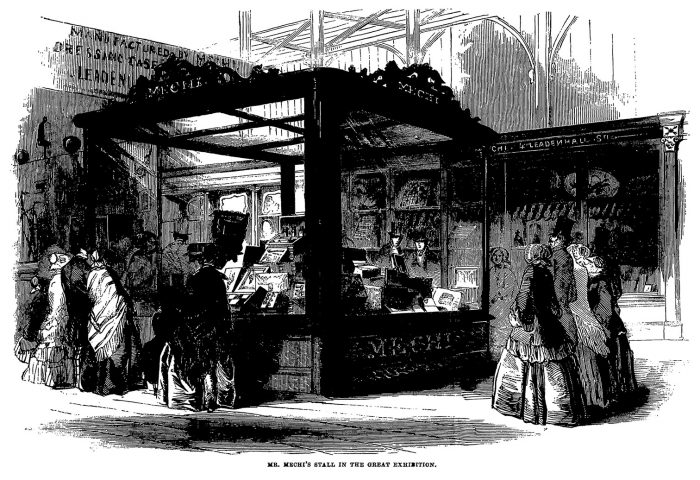
An illustration of Mechi’s stand at the Great Exhibition of 1851 taken from the ‘The Lady’s Newspaper’, September 6th 1851.
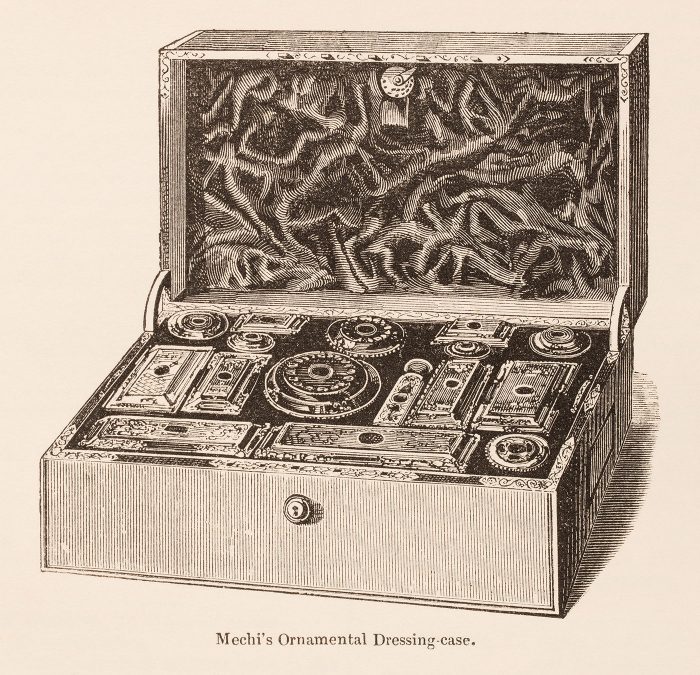
An illustration of Mechi’s ornamental dressing case taken from the ‘Official Descriptive And Illustrated Catalogue Of The Great Exhibition Of The Works Of Industry Of All Nations 1851’.

A description of Mechi’s ornamental dressing case taken from the ‘Official Descriptive And Illustrated Catalogue Of The Great Exhibition Of The Works Of Industry Of All Nations 1851’.
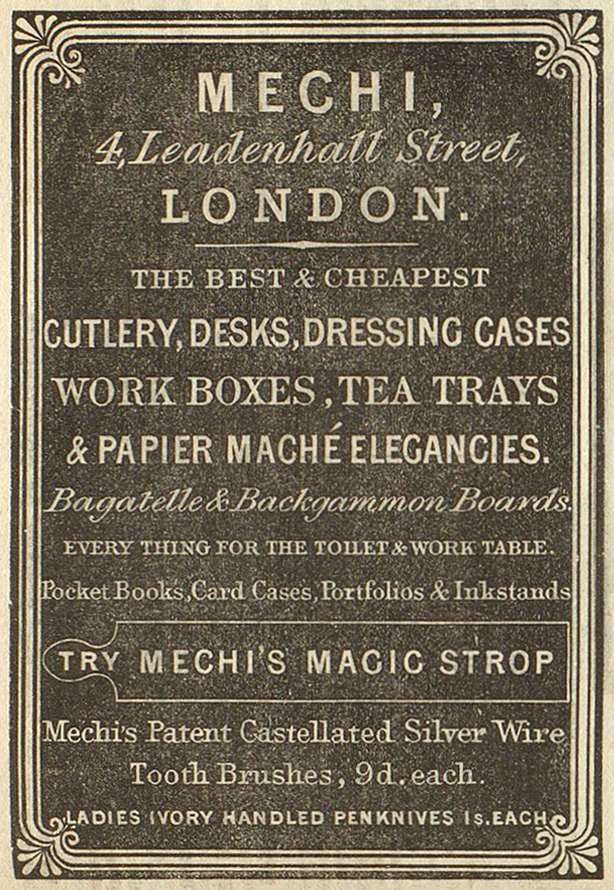
A Mechi advertisement taken from Charles Dickens’ serialised version of ‘Bleak House’ from March 1852.
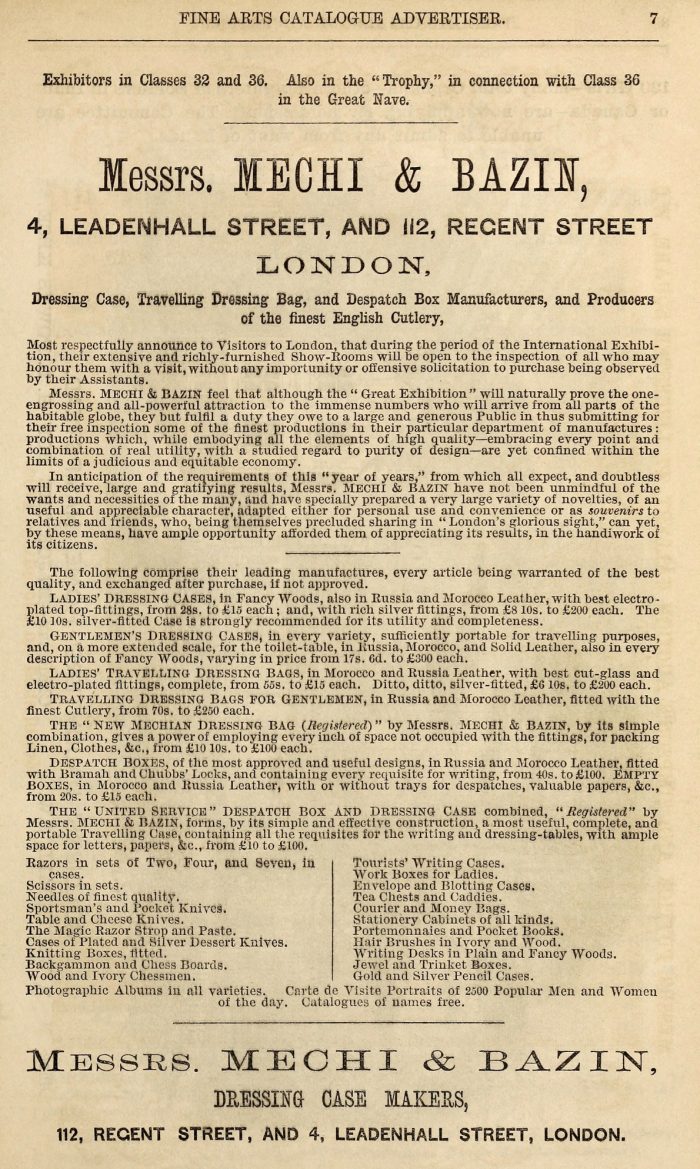
A Mechi & Bazin advertisement taken from the ‘International Exhibition 1862 Official Catalogue of the Fine Art Department’.
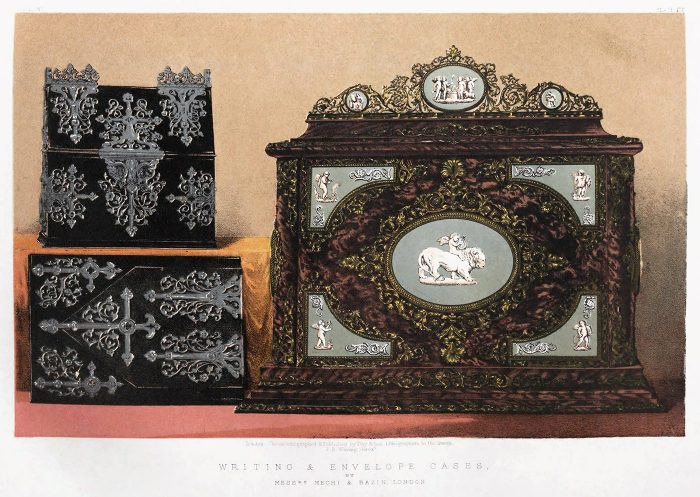
An illustration of writing and envelope cases by Mechi & Bazin taken from the ‘Masterpieces of Industrial Art & Sculpture at the International Exhibition, 1862’ by J.B Waring.
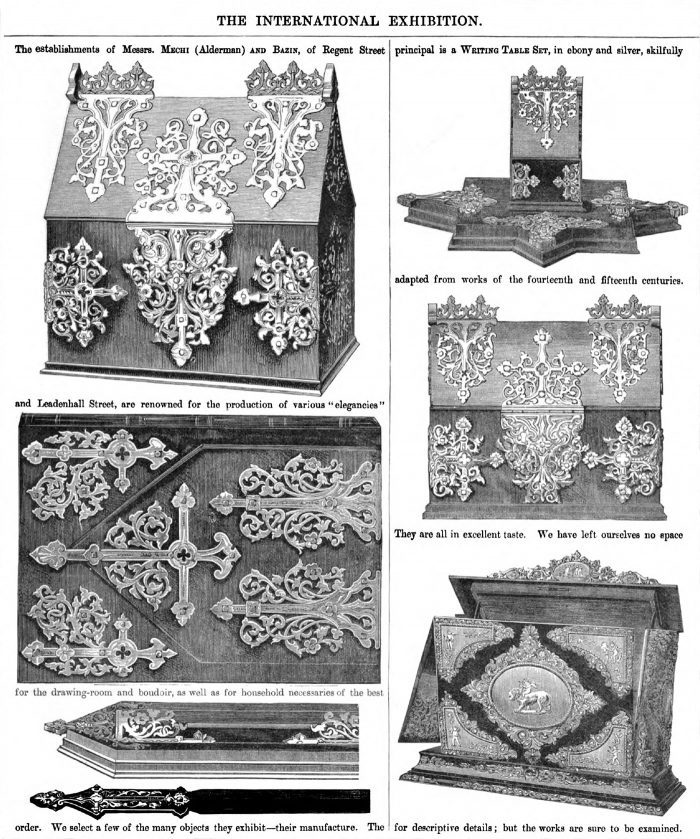
An illustration of a writing table set by Mechi & Bazin taken from ‘The Art Journal Illustrated Catalogue of the International Exhibition 1862’.
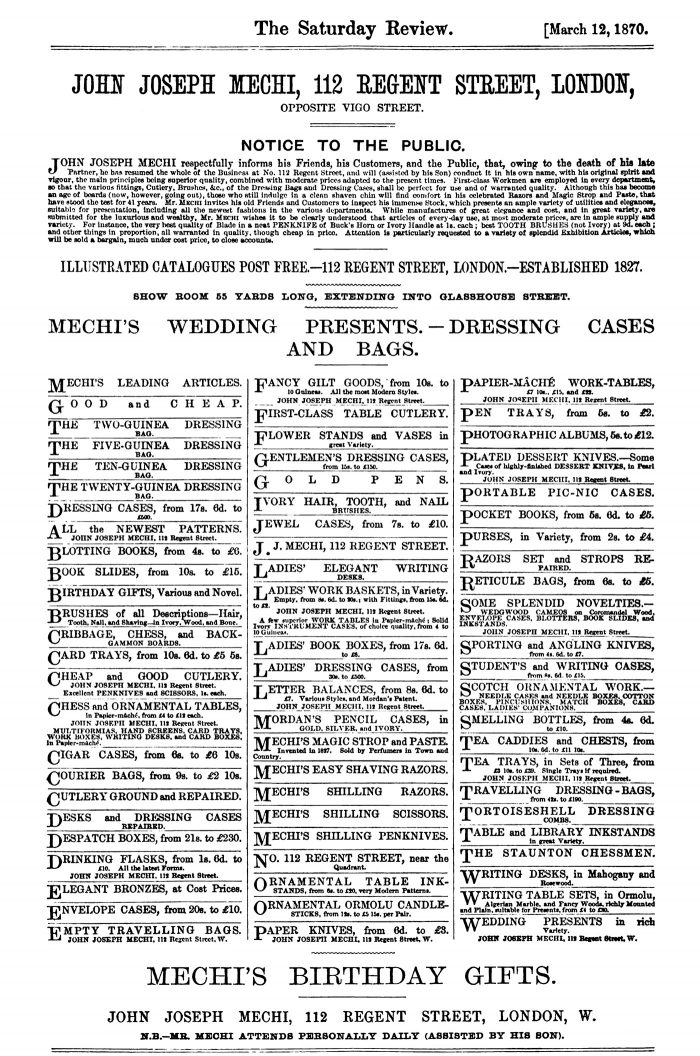
A Mechi advertisement taken from ‘The Saturday Review’ on March 12th 1870.

A Mechi & Bazin engraved brass manufacturer’s and retailer’s plate.
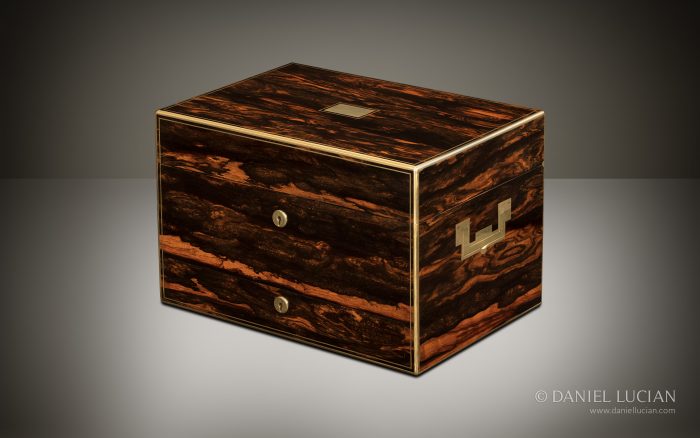
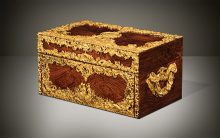 Price On Application
Price On Application